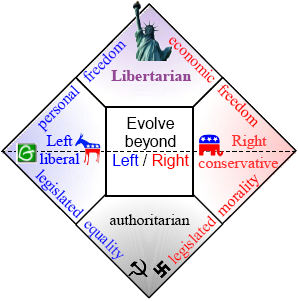Comments from the other thread:
Remember. Nazism is closer to fascism than anything else. The father of modern fascism was Mussolini, who, in his description of fascism, indicated that it was completely opposed to socialism and any left wing ideology. Fascism really can't be categorized on a right-left spectrum, though the kind of fascism that Nazism was can be more easily described as "far right" than anything else. Those who try to paint it as "leftwing" don't know what they are talking about, and are only spewing partisan distortions.
Here is the link to Mussolini's description:
Mussolini - THE DOCTRINE OF FASCISM
And a few key quotes:
Notice how it is anti-liberal and anti-socialist.
Nazism, a specific form of fascism, is anti-liberal, anti-communist (remember how much Hitler hated the communists), anti-socialist, and anti-capitalist. Also remember... during the Night of the Long Knives, Hilter killed George Strasser and all members of the left-wing part of the Nazi Party. From this point on, Nazism was solely right wing.



